Part 1 of the series can be found here
Part 3 of the series can be found here
Part 4 of the series can be found here
Part 5 of the series can be found here
Mahabharata is a Leela of Krishna
The Supreme Lord took the Krishna Avatara for Bhoo Bhara Nivrti, to reduce the burden of Mother Earth. In the 11th Skandha of Bhagavatham, towards the end of His journey on earth, Krishna is found musing whether His purposes has been completed or not.
Krishna performs several Leelas as a part of His avatara. The Mahabharata is yet another Leela, to carry out Bhoo Bhaara Nivrti.
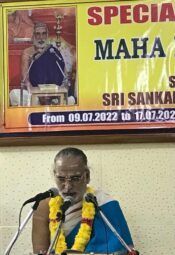
Goddess Durga
The one who wakes up and prays to Durga every day – is there anything they can’t get? Durga is the one who removes afflictions. She is the Param-Gati of Her devotees. She is their Sharanam – their refuge.
The Vedas extol deities such as Indra, Agni, Vayu, Varuna. Usually, God and Goddesses’ names don’t occur in the Vedas.
If a name comes in the Vedas, it is said to be Veda-sambandha. Goddess Durga’s name occurs in the Vedas in Durga Suktham, therefore Her name is said to be Veda-Sambandha.
Daaridya Dukha Bhaya Haarini Bheetim Harasi – Devi Mahatmyam
Durga Devi removes poverty, sadness, fear away from Her devotees
Durga is aardra-chitta – Her heart is warm with love – “I have to help everyone”, She thinks.
One just has to go to a Durga temple on a Tuesday or a Friday to see the unswerving devotion people have towards Durga Devi.
Durga came in Her form and appeared before Yudhishtira. “There will be a war after this year passes. You will win the war”, She told him.
Durga bestows good Arogya (good health), Sampatti (good wealth), Jnanam (Knowledge), and auspiciousness in the house.
Reciting the name of Durga, i.e. Nama-smaranam is sufficient to become a Jivan-mukta! In the Kali Yuga, it is said that worshipping two God’s are special – One is Vinayaka, and the other is Chandi (Durga). They come and bless immediately!
Regardless of how much difficulties and afflictions a person has, Durga comes and removes them all!
The Pandavas Go to Virata’s Court
Yudhishtira
Yudhishtira goes to Virata’s court carrying a tri-dandi, a kamandalu, wearing kashaya clothes, with dharba and pavitra; the attire of a sabhasthara.
When Yudhishtira steps into Virata’s court, every single person gets up as a mark of respect, including King Virata. Every single person.
The Vedas say a person’s physical countenance tells us they are worthy of respect.
Roopam Evaasyai Tan Mayi Maanam Vyajashte
A person’s physical countenance tells us they are worthy of respect.
Yudhishtira introduces himself as Kanka and explains to king Virata how he had gambled and lost all his property, and how he will not swerve from Satya. He philosophically adds there is nothing to say about his body – it is merely an amalgamation of the 5 elements.
He introduces himself as person of gotra Vyaghra Pada. Now, Vyaghra Pada is another name of Lord Yama, and being Yama’s son, this applies to Yudhishtira as well. Yudhishtira cleverly makes a statement that is seemingly a lie (to go incognito), but is truthful in another interpretation.
He reads out the skill sets from his resume to apply to the position of sabhasthara: astrology, shakuna shastra, nimitta shastra, gambling, vedas, vedangas, dharma shastra, Neeti shastra. Virata stops Yudishtira and said “You mentioned gambling, that is enough for me 😁 You’re hired!”
“All the respects that are afforded to me will be afforded to you as well. Vahana (vehicle), simhasana (seat), vastra (attire), ahara (food).”
Yudhishtira replies saying he’s not interested in fancy food and other luxuries, his only goal is to give the king pleasure and keep him entertained.
Bhima
Bhima enters the court from a different direction. Vyasa describes Bhima’s Roopa as Gambheera (majestic), he exudes Tejas (glow), his form is black, he is wearing black clothes, has two sharp knives on the side of his robes, and a big vessel on his head. Unmistakably the attire of a cook.
The word “Bhima” means “Bhayankara”, or terrible. Everyone in the court started shivering in fear on seeing Bhima. Including Virata. Including Keechaka.
Bhima prostrates to Virata as well as Yudhishtira (who has joined the court by this time), and list out his resume – he can cook various kinds of lentils well, he is a master at making rasam, he can cook meat as well.
He introduces himself as a person of the chaturta varna, i.e. a Sudra.
This too is a clever statement. His name has four syllables – Bhi Ma Se Na – he too makes a statement that can’t be discerned by people, but has an element of truth so that he is not telling an outright lie.
Virata asks Bhima – isn’t he better suited to work as a wrestler? Bhima says that he likes to fight, but since there really is nobody equal to his prowess, he doesn’t fight. He also tells Virata that there is nothing derogatory about cooking, it is an art form, and an intricate and difficult one at that.
Usually, food is said to be of four kinds (e.g. Gita 15.14). Here, Bhima lists six kinds of food.
Choshyam – foods that are sucked, like sugarcane
Peyam – drinks, like juices
Lehyam – foods that are licked, e.g. pickles
Bhojyam – foods that are eaten by the teeth, rice and such
Bhakshyam – Sweetmeats like laddu
Charyam – Some foods like Aval (Poha) and groundnuts – they need to be in the mouth for sometime before they can be relished.
Arjuna
Arjuna introduces himself as Brhannala, a eunuch, and offers his services to teach dance, singing and instruments to princess Uthhara.
King Virata looks at his hands, and says these look like that of an archer. Arjuna repeats his prowess in the arts, and secures the job as the music and dance teacher for princess Uthara and other ladies.
King Virata first asks some ladies to verify that Arjuna is indeed a eunuch. Oorvasi’s curse had indeed come good, and this check produced an affirmative result.
After this check was over, he instructed the ladies “Don’t doubt if Brhannala is good or bad. From her looks, it is evident to me that she is from a good family.” Once again, the theme of one’s physical appearance telling a story arose.
Nakula and Sahadeva
Nakula and Sahadeva introduce themselves and respectively secure jobs at the stable and the cow shed.
Queen Sudeshna Sees Draupadi
When Queen Sudeshna was chilling in her balcony, she saw a beautiful lady pass by on the streets. She called her up, and asked her who she was.
“Who are you? Are you Indrani? Or Rati Devi? You are truly beautiful.”
“My name is Sairandhri. Circumstances have forced me to come here. I offer my services to you. I can do a variety of services. For instance, I can prepare sandalwood paste. I have even made sandalwood paste for Satyabhama. Also, I’m Draupadi’s dearest friend”, said Draupadi.
“Excellent. However, I don’t wish to hire you. My husband is a good man. I’d prefer him to remain a good man. That may well come under question if he takes a look at you”, said Queen Sudeshna.
“Nobody can desire me”, said Draupadi, “If somebody looks at me the wrong way, they will die. I am under the protection of 5 Gandharvas. I should, however specify that I have two niyamas (stipulations): I won’t eat anybody’s leftovers, and I won’t wash anybody else’s feet.”
Queen Sudeshna reconsidered the decision. She was afraid that fortune may desert her if she turns away Sairandhri, and decided to hire her.
Vaisampayana sheds a tear here, reflecting on Draupadi’s plight. A yagyaseni on her own right, circumstances have made her take refuge in another queen’s service.
A Note on Rain and the Virata Parva
It is said that reciting the Virata Parva produces rains. However, the Phala Shruti for this parva does not mention rains explicitly. Villuputhurar, in his Tamil composition of the Mahabharata, notes that while the Pandavas go incognito in the most capable manner, Nature does everything to reveal their identity!
While the rains were sporadic and infrequent in adjoining kingdoms, with some kingdoms experiencing droughts, the Virata kingdom experienced perfect rainfall, not too much and not too less, thanks to the presence of the Pandavas and Draupadi, who were embodiments of virtue.
10 Months Go By Uneventfully
Pandavas and Draupadi live an uneventful life at Virata’s palace. In the fourth month, there is an Utsava at the Siva temple in the kingdom. Festivity fills the air. One of the activities is a wrestling contest. A wrestler from the North name Jeemoothan comes with 1000 followers and remains undefeated.
Yudhishtira suggests to King Virata that the wrestlers in the palace are not equipped to take on Jeemoothan. He suggests asking Bhima to take on Jeemothan. Virata duly asks Bhima, who initially refuses, but is persuaded and easily defeats the wrestlers, to Virata’s delight.
10 months go by uneventfully in Virata’s palace.
Enter Keechaka
Draupadi took the greatest care to go about the palace quarters without being seen by anyone else. In spite of her best efforts, Keechaka, Queen Sudeshna’s brother, saw her and immediately got smitten with Kama’s arrows.
“She looks like a devata”, he told Sudeshna. “Is she Parvati? Is she a devata who rose from the ground? Is she a naga kannika? Who is she?”, he asked Sudeshna.
“Why do you ask”, queried Sudeshna.
“I desire her. I must have her.”
“She’s come here for refuge. Nobody should see her, let alone touch her. She is under the protection of 5 Gandharvas, who will kill anybody who go near her.”
“Just 5? I can take on 1000 Gandharvas”, said Keechaka haughtily.
Sudeshna tried reasoning with Keechaka repeatedly, but failed. Finally, due to her attachment to her brother, she caved in and said “I’ll send her to you”.
Veda Vyasa mentions the term “Kaala Chodita” here – to signify that Keechaka has fallen into a trap set by time. Eschewing the sage advice given by his sister, Keechaka nevertheless chooses to do the wrong thing – falling prey to the trap set for him by kaala. Valmiki uses the same term “Kala Chodita” when Ravana disregards the advice given by Vibheeshana and falls prey to the trap set by time.
Keechaka Misbehaves with Draupadi
Sudeshna asks Draupadi to go to Keechaka’s place with a vessel, and return back with what Keechaka gives. Draupadi immediately knows that something is afoot, and appeals to Sudeshna, “You’ve treated me honourably for 10 months so far. Please let me not go to Keechaka’s house.” Sudeshna forced Draupadi to go there, giving Draupadi no option out.
Draupadi prayed to the devatas Indra, Vayu, Agni, Varuna, Ashwini Kumaras, Yama and others before stepping out. She specifically cried praying to Surya for one muhurta kala. Surya Bhavagan helped Draupadi in the past, giving her the Akshaya Patra to feed all the people who were with the Pandavas in the forest. Surya Bhagavan answered Draupadi’s prayers this time as well, and sent a Maha-balishta (a strong person) to invisibly follow Draupadi wherever she goes.
Draupadi reaches Keechaka’s house.
Keechaka: “You possess astonishing beauty. I possess astonishing physical strength. We should marry each other.”
Draupadi: “I’ve come on Queen Sudeshna’s behest. Please fill this vessel and I’ll take it to Sudeshna’s place.”
Keechaka: “Didn’t you already know that Sudeshna sent you on a pretext for my sake?”
Keechaka then pulled Draupadi’s right hand. Draupadi screamed, dropped the vessel, and started running. Keechaka runs after Draupadi, chasing her. Draupadi runs all the way to Virata’s Sabha.
Keechaka follows her to Virata’s Sabha, and behaves disgracefully – he pulls her by her hair and kicks her. She falls down, blood oozing from her mouth. And nobody in the court could do anything. Before Keechaka could make another move, Surya’s emissary pushes Keechaka and rolls him on to the ground. Keechaka fell down like a tree whose root has been uprooted.
Typically, only Yudhishtira is present in the king’s court, and the other Pandavas are in their respective work places. As it turned out, all 5 Pandavas were in court that day. Bhima gets furious. His lips quiver, his hands shake with rage. He looks at the trees outside, evaluating “Which tree is most appropriate for me to uproot to take on Keechaka?”
Yudhishtira sees all this and with caution in mind, tells Bhima “Is the cooking over in the kitchen? The trees you are sizing up are not appropriate for obtaining firewood, these are fruit-bearing trees. You are better off getting firewood from dead trees. This is not the time to be angry.”
The fruit-bearing tree statement had another significance – their ajnata vasa was almost over was close to bearing fruit -only 13 days were left – this is not the time to be rash and jeopardise the disguises.
The statement on this not being the right time to get angry had another significance. There were 105 upa-keechakas as well – if Bhima chose to kill, he should kill all of them as well – and only Keechaka was there now, and this was not the right time to get angry.
Draupadi saw all this, and got sadder. She asked King Virata, “You are the king. You have to protect orphans. Shouldn’t you be protecting me?”
Virata couldn’t do anything – he depended on Keechaka as his commander-in-chief to protect the kingdom from enemies. Fearing Keechaka, other kingdoms didn’t wage war on the Virata kingdom.
Yudhishtira pacifies her and sends her back to Sudeshna’s chambers. Draupadi went back to Sudeshna crying. Sudeshna feigned ignorance, and consoled her.
From that point, Draupadi stopped showering, stopped eating, stopped changing her clothes. She didn’t even bother to remove the mud from her body when she fell on the ground.
Draupadi Seeks Out Bhima
Shedding bucketloads of tears, Draupadi decided that Bhima was the only one who could help her.
After everyone else had slept, she left Sudeshna’s quarters and went to the kitchen. Bhima was sleeping, tired from all the cooking.
Draupadi touches the sleeping Bhima and wakes him up.
“Wake up Bheema. Are you even alive? Did you not see the insult that befell me in court today?”
She then proceeds to recount all her woes to Bhima – how she had to go through repeated troubles from various quarters. First, she had to go through that ghastly experience in the hands of Dushasana. Then, Jayadrata tried to accost her in the forest. Followed by Jadasura. And now Keechaka.
She continues crying and shows Bhima her hands, which are filled with blisters. Each day, she has to grind three whole sandalwood sticks to prepare fresh paste for King Virata. Bhima sees her hands, and in turn starts crying, and asks her about this.
“First, you kill Keechaka”, Draupadi tells him.
“Okay, ask him to come to the Natyashala tomorrow night. I will go instead of you. And kill him”, said Bhima.
The entire discourse (in Tamil) can be viewed here
Picture credit: Yogesa, CC BY-SA 3.0, via Wikimedia Commons

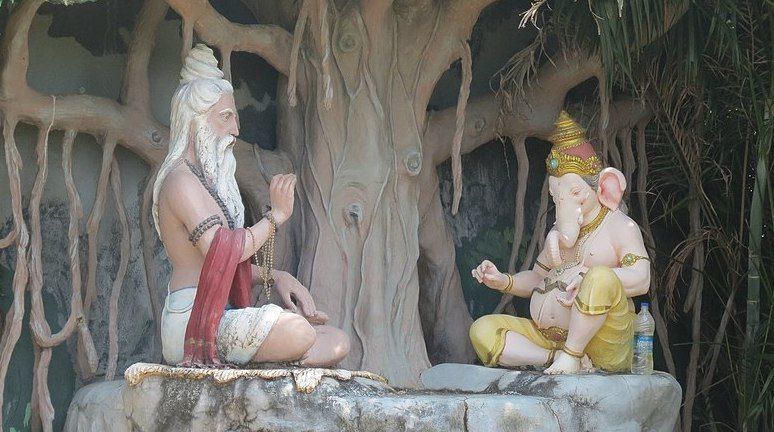

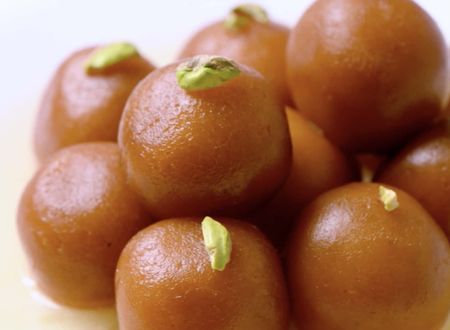
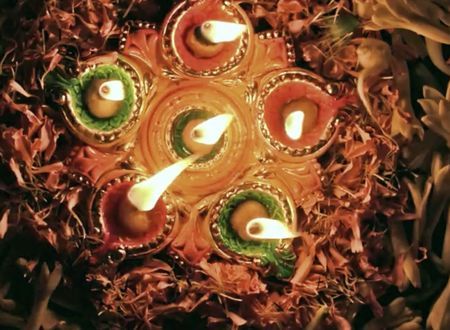
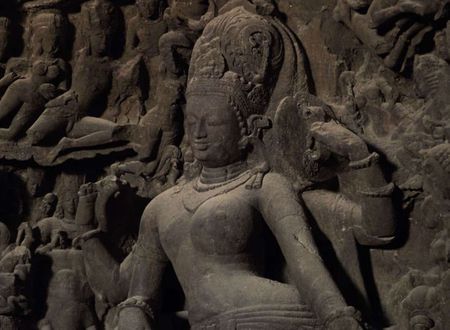
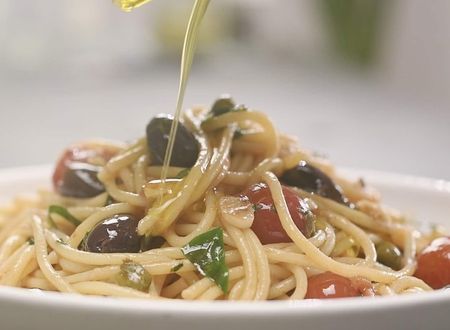


Comments & Discussion
18 COMMENTS
Please login to read members' comments and participate in the discussion.